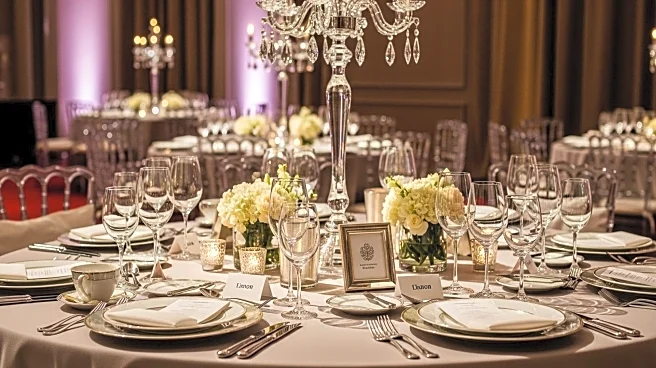What's Happening?
Variety and Chanel hosted their annual Women in Film Dinner during the Toronto Film Festival, celebrating female filmmakers and promoting gender representation in the film industry. The event took place at Soho House and was attended by notable figures such as Shailene Woodley, Gugu Mbatha-Raw, Jessie Buckley, and Ethan Hawke. The dinner highlighted the achievements of Chanel’s Women Writers’ Network, a program designed to support women and non-binary alumni of the TIFF Writers’ Studio. The event featured speeches from Variety co-editor-in-chief Ramin Setoodeh, TIFF CEO Cameron Bailey, and Chanel Canada CEO Gregoire Collignon, emphasizing the importance of representation and the role of men in supporting women in film.
Why It's Important?
The event underscores the ongoing efforts to increase gender representation in the film industry, a sector historically dominated by men. By supporting female and non-binary filmmakers, initiatives like Chanel’s Women Writers’ Network aim to diversify the voices and stories presented in cinema. This can lead to a broader range of perspectives and narratives, enriching the cultural landscape and providing audiences with more inclusive content. The involvement of high-profile figures and organizations in these efforts highlights the growing recognition of the need for gender equity in creative industries.
What's Next?
The continued support and development of programs like Chanel’s Women Writers’ Network are expected to foster more opportunities for women and non-binary filmmakers. As these initiatives gain momentum, they may inspire similar efforts across other sectors of the entertainment industry. The success of such programs could lead to increased collaboration between established industry figures and emerging talent, potentially resulting in more diverse and innovative film projects.
Beyond the Headlines
The event also highlights the cultural shift towards inclusivity and representation in media. As more organizations and individuals commit to these values, there may be a long-term impact on how stories are told and who gets to tell them. This could lead to a more equitable industry where diverse voices are not only heard but celebrated.









